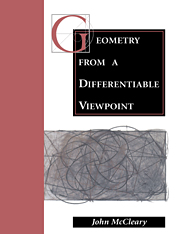Book contents
- Frontmatter
- Contents
- Introduction
- PART A Prelude and themes: Synthetic methods and results
- PART B Development: Differential geometry
- PART C Recapitulation and coda
- 14 Abstract surfaces
- 15 Modeling the non-Euclidean plane
- 16 Epilog: Where from here?
- Riemann's Habilitationsvortrag: On the hypotheses which lie at the foundations of geometry
- Appendix: Notes on selected exercises
- Bibliography
- Symbol index
- Name index
- Subject index
16 - Epilog: Where from here?
Published online by Cambridge University Press: 05 June 2012
- Frontmatter
- Contents
- Introduction
- PART A Prelude and themes: Synthetic methods and results
- PART B Development: Differential geometry
- PART C Recapitulation and coda
- 14 Abstract surfaces
- 15 Modeling the non-Euclidean plane
- 16 Epilog: Where from here?
- Riemann's Habilitationsvortrag: On the hypotheses which lie at the foundations of geometry
- Appendix: Notes on selected exercises
- Bibliography
- Symbol index
- Name index
- Subject index
Summary
Alongside Euclid, who still holds pride of place, Lobachevskiῐ and Riemann have played a particularly important role in research on the foundation of geometry, but Riemann comes before the others.
Sophus Lie (1893)On the tenth day of June 1854 G. F. Bernhard Riemann (1826–60) delivered a lecture to the Philosophical Faculty of the University in Göttingen to fulfill the requirements of promotion to Privatdozent. As was customary, Riemann offered three possible topics for his lecture. The first two dealt with parts of his Habilitationsschrift (a second thesis also required for promotion), and the third with the foundations of geometry. Against usual practice, Gauss chose the third topic and Riemann offered the lecture Ueber die Hypothesen, welche der Geometrie zu Grunde liegen (On the hypotheses that lie at the foundations of geometry). In it he launched the next stage of development of differential geometry. A translation of Riemann's words follows this chapter.
The text of the lecture did not appear in Riemann's lifetime. Its posthumous publication in 1868 (in the 1866/67 Abhandlungen der Königlichen Gesellschaft der Wissenschaften zu Göttingen) brought a nearly immediate response from the community of mathematicians working on differential geometry. The period of the subject driven by fundamental elementary questions, especially non-Euclidean geometry, ends coincidentally in 1868 with the publication of Beltrami's Saggio di interpretazione della geometria non-euclidea (Beltrami 1868). Beltrami did not finish his study of non-Euclidean geometry with this paper.
Information
- Type
- Chapter
- Information
- Geometry from a Differentiable Viewpoint , pp. 242 - 268Publisher: Cambridge University PressPrint publication year: 1995
